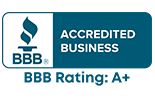Concrete is one of the most durable building materials you can have around your home, but it is not invincible. Without proper protection, driveways, patios, and walkways can develop cracks, stains, and surface wear from New York’s weather, daily use, and even lawn chemicals. This is where concrete sealing and coating comes in.
At Zavza Seal, we help homeowners in Long Island, Brooklyn, Queens, and the Bronx protect their concrete so it stays strong, looks great, and lasts for decades. In this guide, we’ll walk you through why sealing matters, when to do it, the differences between sealers, and how to maintain your investment.
Why You Should Seal Your Concrete
Concrete is naturally porous. That means it can absorb water, oils, and chemicals that weaken it over time. By sealing your concrete, you are creating a barrier that:
- Prevents water penetration which reduces freeze-thaw damage in winter
- Blocks stains from oil, grease, and food spills
- Protects against de-icing salts and road grime
- Reduces surface dusting from wear and tear
- Improves appearance by enhancing color and texture
- Extends lifespan so you save on costly repairs or replacement
Unsealed concrete may look fine for the first couple of years, but in New York’s freeze-thaw climate, damage can escalate quickly. Tiny cracks can become trip hazards and stains can become permanent eyesores.
When to Seal Concrete Surfaces
Timing matters for concrete sealing. The ideal sealing schedule depends on whether your surface is new or existing:
- New concrete: Wait at least 28 days after installation before sealing. This gives the concrete time to cure fully.
- Existing concrete: Seal it as soon as you notice water absorbing instead of beading on the surface, or if the finish looks dull.
As a rule of thumb:
- Driveways: Reseal every 2–3 years
- Patios: Reseal every 3–4 years
- High-traffic commercial areas: May require annual touch-ups
Sealing in spring or early fall is best in New York. Temperatures should be between 50°F and 85°F, and the forecast should be dry for at least 24 hours.
Types of Concrete Sealers
There are two main categories of sealers, each with its own benefits and best uses.
1. Penetrating Sealers
Penetrating sealers soak into the concrete and react chemically to form a protective barrier beneath the surface.
Best for:
- Outdoor areas exposed to rain, snow, and freeze-thaw cycles
- Homeowners who want a natural, non-glossy finish
- Long-lasting protection without frequent resealing
Pros:
- Invisible protection that does not alter surface appearance
- Excellent resistance to moisture and de-icing salts
- Breathable, so trapped moisture can escape
Cons:
- Limited color enhancement
- May not protect against surface stains from oil or food
Common types: Silane, siloxane, and siliconate sealers.
2. Film-Forming Sealers
Film-forming sealers create a protective layer on top of the concrete.
Best for:
- Decorative concrete such as stamped or stained patios
- Indoor concrete floors
- Areas where a glossy or satin finish is desired
Pros:
- Enhances and deepens surface color
- Can provide slip resistance when additives are included
- Protects against stains and surface wear
Cons:
- Less breathable, which can trap moisture if applied incorrectly
- More prone to wear in high-traffic outdoor areas
- Requires more frequent reapplication than penetrating sealers
Common types: Acrylics, polyurethanes, and epoxies.
Choosing the Right Sealer for Your Home
The right sealer depends on:
- Climate: In New York’s cold winters, a penetrating sealer often offers the best freeze-thaw protection for driveways and walkways.
- Use: For decorative patios where appearance matters, a film-forming sealer can bring out rich colors.
- Maintenance preference: If you want a low-maintenance option, penetrating sealers usually last longer between applications.
At Zavza Seal, we evaluate your concrete’s age, condition, and exposure before recommending the right product. This ensures you get maximum protection without overspending on unnecessary features.
How to Seal a Concrete Surface
While some homeowners attempt DIY sealing, professional application ensures better coverage and durability. Here’s the general process:
- Inspection
We check for cracks, spalling, or pitting and repair them before sealing. - Cleaning
Dirt, oil, mold, and old sealers are removed with power washing and eco-friendly cleaning solutions. - Drying
The surface must be completely dry for the sealer to bond properly. - Application
- Penetrating sealers are applied with low-pressure sprayers for even coverage.
- Film-forming sealers are applied with rollers or sprayers in thin coats.
- Curing
We allow adequate drying time before the area is used. This can range from a few hours to 48 hours depending on the product.
Maintenance After Sealing
Sealed concrete is low-maintenance, but not no-maintenance. To keep it in top shape:
- Sweep regularly to prevent abrasive dirt from wearing down the surface.
- Clean spills promptly to avoid staining.
- Avoid harsh chemicals like paint strippers or strong acids.
- Use non-metal shovels and plastic snow blowers to avoid scratching in winter.
- Reapply the sealer according to the manufacturer’s lifespan recommendations.
Expected Lifespan of Sealed Concrete
The lifespan depends on the sealer type, the surface use, and the environment:
- Penetrating sealers: 5–10 years
- Acrylic film-forming sealers: 1–3 years
- Polyurethane/epoxy sealers: 3–7 years
Heavy traffic areas and exposure to de-icing salts can shorten the lifespan, so periodic inspections are important.
Why Choose Zavza Seal for Concrete Sealing in New York
At Zavza Seal, we understand the unique challenges of maintaining concrete in Long Island, Brooklyn, Queens, and the Bronx. Our local expertise means:
- We select sealers designed for New York’s freeze-thaw climate.
- We offer both penetrating and film-forming solutions tailored to your needs.
- Our team ensures flawless application with professional-grade tools and techniques.
- We provide guidance on ongoing care to maximize your investment.
A properly sealed driveway or patio not only looks great but also saves you from costly repairs caused by water damage, salt corrosion, and surface wear.
Final Thoughts
Concrete sealing is one of the smartest investments you can make for your property. It protects your surfaces from damage, keeps them looking their best, and extends their usable life. Whether you have a brand-new driveway in Long Island or a weather-worn patio in the Bronx, Zavza Seal can help you choose and apply the perfect sealer for lasting protection.
If your concrete is starting to absorb water, show stains, or lose its finish, now is the time to act. Contact Zavza Seal today for a free inspection and professional sealing service that keeps your surfaces safe, beautiful, and durable for years to come.








